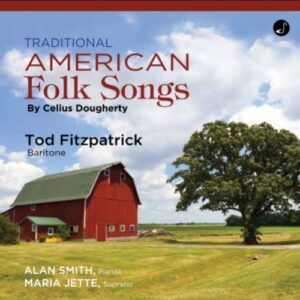Although Celius Dougherty (1902-1986) gained renown as an accompanist to some of the finest singers during the 1930s and 1940s, he left behind an even greater legacy of works for voice and piano. These include some of the best folk song settings penned by any composer, and their time is ripe for rediscovery, as this wonderful release proves time and again.
In some respects Dougherty was to the American art song as Morton Gould was to the American orchestral suite, for each composer wears his sophistication and skill lightly. What is more, Dougherty’s piano parts are consistently ingenuous and idiomatic, yet never fail to support the vocal lines and enhance the words. Take Red River Valley, for example. An unassuming counter-line gently emerges from the rolling accompaniment, gradually working its way up to the middle register, reaching an aching intensity in the piano’s higher octaves for the last verse. The spiky dissonances in the introduction and interludes to the sea chanty Mobile Bay contrast to the piano’s relatively straightforward backing when the singer enters. And Dougherty’s slow and brooding setting of Barbara Allen digs deeper than the lyrical, sweet-toned arrangements we usually find for this popular song.
Tod Fitzpatrick’s gorgeously modulated baritone voice and idiomatic flexibility (he totally gets the inner “swing” of the bluesy The Lady Who Loved a Pig) are ideal for this repertoire. Indeed, his diction is so spot-on that the enclosed texts might be considered superfluous. Soprano Maria Jette joins Fitzpatrick for the Six Songs from the American Countryside, a cycle of duets that Dougherty wrote for Evelyn Lear and Thomas Stewart in 1965. The vocal lines are strikingly independent and convey their own individual characters, yet never step on each other’s toes, so to speak. These exact words apply to the performances in hand. Alan Smith’s meticulous and bracingly supportive piano work is a class act in itself, as is Andreas K. Meyer’s production. Highly recommended.
































